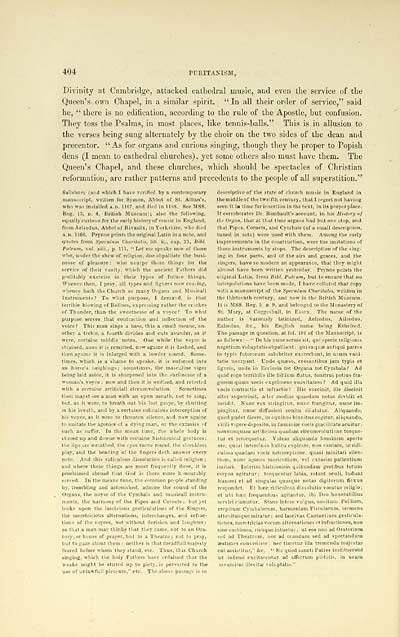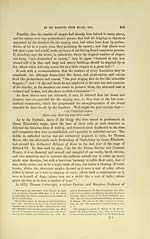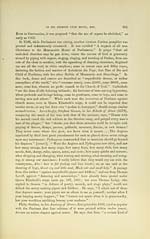Glen Collection of printed music > Printed text > Popular music of the olden time > Volume 2
(28) Page 404
Download files
Complete book:
Individual page:
Thumbnail gallery: Grid view | List view

404
PURITANISM,
Divinity at Cambridge, attacked cathedral music, and even the service of the
Queen's own Chapel, in a similar spirit. " In all their order of service," said
he, " there is no edification, according to the rule of the Apostle, but confusion.
They toss the Psalms, in most places, like tennis-balls." This is in allusion to
the verses being sung alternately by the choir on the two sides of the dean and
precentor. "As for organs and curious singing, though they be proper to Popish
dens (I mean to cathedral churches), yet some others also must have them. The
Queen's Chapel, and these churches, which should be spectacles of Christian
reformation, are rather patterns and precedents to the people of all superstition."
Salisbury (and which I have verified by a contemporary
manuscript, written for Symon, Abbot of St. Alban's,
who was installed a.d. Ilfi7, and died in 11SS. See MSS.
tleg. 13, d. 4, British Museum); also the following-,
equally curious for the early history of music in England,
from Aehedus, Abbot of Rivaulx, in Yorkshire, who died
a.d. 1 16(3. Pry nne prints the original Latin in a note, and
quotes from Speculum Charitatis, lib. ii., cap. 23, Bibl.
Patrum, vol. xiii., p. Ill, " Let me speake now of those
who, under the shew of religion, doe obpalliate the busi-
nesse of pleasure : who usurpe those things for the
service of their vanity, which the ancient Fathers did
profitably exercise in their types of future things.
Whence then, I pray, all types and figures now ceasing,
whence hath the Church so many Organs and Musicall
Instruments? To what purpose, I demand, is that
terrible blowing of Belloes, expressing rather the crackes
of Thunder, than the sweetnesse of a voyce? To what
purpose serves that contraction and inflection of the
voice? This man sings a base, this a small meane, an-
other a treble, a fourth divides and cuts asunder, as it
were, certaine middle notes. One while the voyce is
strained, anon it is remitted, now againe it is dashed, and
then againe it is inlarged with a lowder sound. Some-
times, which is a shame to speake, it is enforced into
an horse's neighings; sometimes, the masculine vigor
being laid aside, it is sharpened into the shrilnesse of a
woman's voyce : now and then it is writhed, and retorted
with a certaine artificiall circumvolution. Sometimes
thou mayst see a man with an open mouth, not to sing,
but, as it were, to breath out his last gaspe, by shutting
in his breath, and by a certaine ridiculous interception of
his voyce, as it were to threaten silence, and now againe
to imitate the agonies of a dying man, or the extasies of
such as suffer. In the mean time, the whole body is
stirred up and dowue with certaine histrionical gestures:
the lips are wreathed, the eyes turne round, the shoulders
play, and the bending of the fingers doth answer every
note. And this ridiculous dissolution is called religion ;
and where these things are most frequently done, it is
proclaimed abroad that God is there more honourably
served. In the meane time, the common people standing
by, trembling and astonished, admire the sound of the
Organs, the noyse of the Cymbals and musicall instru-
ments, the harmony of the Pipes and Cornets : but yet
looke upon the lascivious gesticulations of the Singers,
the meretricious alternations, interchanges, and infrac-
tions of the voyces, not without derision and laughter;
so that a man may thinke that they came, not to an Ora-
tory, or house of prayer, but to a Theatre; not to pray,
but to gaze about them : neither is that dreadfull majesty
feared before whom they stand, etc. Thus, this Church
singing, which the holy Fathers have ordained that the
weake might be stirred up to piety, is perverted to the
use of unlawfull pleasure," etc. The above passage is so
descriptive of the state of church music in England in
themiddleof the twelfth century, that I regret not having
seen it iu time for insertion in the text, in its properplace.
It corroborates Dr. Rimbault's account, in his History of
the Organ, that at tiiat time organs had but one stop, and
that Pipes, Cornets, and Cymbals (of a small description,
tuned in sets) were used with them. Among the early
improvements in the construction, were the imitations of
those instruments by stops. The description of the sing-
ing in four parts, and of the airs and graces, and the
singers, have so modern an appearance, that they might
almost have been written yesterday. Prynne prints the
original Latin, from Bibl. Patrum, but to ensure that no
interpolations have been made, I have collated that copy
with a manuscript of the Speculum Charitatis, written in
the thirteenth century, and now in the British Museum.
It is MSS. Reg. 5, e. 9, and belonged to the Monastery of
S't. Mary, at Coggeshall, in Essex. The name of the
author is variously latinized, Aelredus, Ailredus,
Ealredus, &c, his English name being Ethelred.
The passage in question, at fol. 191 of the Manuscript, is
as follows: — " De his nunc sermo sit, qui specie religionis
negotium vuluptatisobpalllant: qui ea quae antiqui patres
in typis futororum salubriter exercebant, in usum vani-
tatis usurpant. Unde quaeso, cessantibus jam typis et
figuris, unde in Ecclesia tot Organa totCymbala? Ad
quid rogo terribilis ille follium flatus, tonitrui potius fra-
gorem quam vocis exprimens suavitatem? Ad quid ilia
vocis contractio et infractio? Hie succinit, ille discinit
alter superciuit, alter medias quasdam notas dividit et
iucidit. Nunc vox stringitur, nunc frangitur, nunc im-
pingitur, nunc diffusiori sonitu dilatatur. Aliquando,
quod pudet dicere, in equinos hinnitus cogitur, aliquando,
virili vigore deposito, in fceminiae vocis gracilitateacuitur;
nonnunquam artificiosa quadam circumvolutione torque-
tur et retorquetur. Videas aliquando hominem aperto
ore, quasi intercluso halitu expirare, non cantare, ac ridi-
culosa quadam vocis interceptione, quasi minitari silen-
tium, nunc agones morientium, vel extasim patientium
imitari. Interim histrionicis quibusdam gestibus totum
corpus agitatur ; torquentur labia, rotant oculi, ludunt
humeri et ad singulas quasque notas digitorum nexus
responded Et haec ridiculosa dissolutio vocatur religio ;
et ubi haec frequentius agitantur, ibi Deo honorabilius
serviri clamatur. Stans intere vulgus, sonitum Follium,
crepitum Cyinbalorum, harraoniam Fistularum, tremens
attonitusquemiratur: sedlascivas Cantantium gesticula-
tiones, mentricias vocum alternationes et infractiones, non
sineeachinno, risuque intuelur ; ut eos non ad Oratorium
sed ad Theatrum, nee ad orandum sed ad spectandum
aestimes convenisse: nee thnetur ilia tremenda majestas
cui assistitur," &c. " Sic quod sancti Patres instituerunt
ut infirmi excitarentur ad affectum pietatis, in usum
assumituT illecitae voluptatis."
PURITANISM,
Divinity at Cambridge, attacked cathedral music, and even the service of the
Queen's own Chapel, in a similar spirit. " In all their order of service," said
he, " there is no edification, according to the rule of the Apostle, but confusion.
They toss the Psalms, in most places, like tennis-balls." This is in allusion to
the verses being sung alternately by the choir on the two sides of the dean and
precentor. "As for organs and curious singing, though they be proper to Popish
dens (I mean to cathedral churches), yet some others also must have them. The
Queen's Chapel, and these churches, which should be spectacles of Christian
reformation, are rather patterns and precedents to the people of all superstition."
Salisbury (and which I have verified by a contemporary
manuscript, written for Symon, Abbot of St. Alban's,
who was installed a.d. Ilfi7, and died in 11SS. See MSS.
tleg. 13, d. 4, British Museum); also the following-,
equally curious for the early history of music in England,
from Aehedus, Abbot of Rivaulx, in Yorkshire, who died
a.d. 1 16(3. Pry nne prints the original Latin in a note, and
quotes from Speculum Charitatis, lib. ii., cap. 23, Bibl.
Patrum, vol. xiii., p. Ill, " Let me speake now of those
who, under the shew of religion, doe obpalliate the busi-
nesse of pleasure : who usurpe those things for the
service of their vanity, which the ancient Fathers did
profitably exercise in their types of future things.
Whence then, I pray, all types and figures now ceasing,
whence hath the Church so many Organs and Musicall
Instruments? To what purpose, I demand, is that
terrible blowing of Belloes, expressing rather the crackes
of Thunder, than the sweetnesse of a voyce? To what
purpose serves that contraction and inflection of the
voice? This man sings a base, this a small meane, an-
other a treble, a fourth divides and cuts asunder, as it
were, certaine middle notes. One while the voyce is
strained, anon it is remitted, now againe it is dashed, and
then againe it is inlarged with a lowder sound. Some-
times, which is a shame to speake, it is enforced into
an horse's neighings; sometimes, the masculine vigor
being laid aside, it is sharpened into the shrilnesse of a
woman's voyce : now and then it is writhed, and retorted
with a certaine artificiall circumvolution. Sometimes
thou mayst see a man with an open mouth, not to sing,
but, as it were, to breath out his last gaspe, by shutting
in his breath, and by a certaine ridiculous interception of
his voyce, as it were to threaten silence, and now againe
to imitate the agonies of a dying man, or the extasies of
such as suffer. In the mean time, the whole body is
stirred up and dowue with certaine histrionical gestures:
the lips are wreathed, the eyes turne round, the shoulders
play, and the bending of the fingers doth answer every
note. And this ridiculous dissolution is called religion ;
and where these things are most frequently done, it is
proclaimed abroad that God is there more honourably
served. In the meane time, the common people standing
by, trembling and astonished, admire the sound of the
Organs, the noyse of the Cymbals and musicall instru-
ments, the harmony of the Pipes and Cornets : but yet
looke upon the lascivious gesticulations of the Singers,
the meretricious alternations, interchanges, and infrac-
tions of the voyces, not without derision and laughter;
so that a man may thinke that they came, not to an Ora-
tory, or house of prayer, but to a Theatre; not to pray,
but to gaze about them : neither is that dreadfull majesty
feared before whom they stand, etc. Thus, this Church
singing, which the holy Fathers have ordained that the
weake might be stirred up to piety, is perverted to the
use of unlawfull pleasure," etc. The above passage is so
descriptive of the state of church music in England in
themiddleof the twelfth century, that I regret not having
seen it iu time for insertion in the text, in its properplace.
It corroborates Dr. Rimbault's account, in his History of
the Organ, that at tiiat time organs had but one stop, and
that Pipes, Cornets, and Cymbals (of a small description,
tuned in sets) were used with them. Among the early
improvements in the construction, were the imitations of
those instruments by stops. The description of the sing-
ing in four parts, and of the airs and graces, and the
singers, have so modern an appearance, that they might
almost have been written yesterday. Prynne prints the
original Latin, from Bibl. Patrum, but to ensure that no
interpolations have been made, I have collated that copy
with a manuscript of the Speculum Charitatis, written in
the thirteenth century, and now in the British Museum.
It is MSS. Reg. 5, e. 9, and belonged to the Monastery of
S't. Mary, at Coggeshall, in Essex. The name of the
author is variously latinized, Aelredus, Ailredus,
Ealredus, &c, his English name being Ethelred.
The passage in question, at fol. 191 of the Manuscript, is
as follows: — " De his nunc sermo sit, qui specie religionis
negotium vuluptatisobpalllant: qui ea quae antiqui patres
in typis futororum salubriter exercebant, in usum vani-
tatis usurpant. Unde quaeso, cessantibus jam typis et
figuris, unde in Ecclesia tot Organa totCymbala? Ad
quid rogo terribilis ille follium flatus, tonitrui potius fra-
gorem quam vocis exprimens suavitatem? Ad quid ilia
vocis contractio et infractio? Hie succinit, ille discinit
alter superciuit, alter medias quasdam notas dividit et
iucidit. Nunc vox stringitur, nunc frangitur, nunc im-
pingitur, nunc diffusiori sonitu dilatatur. Aliquando,
quod pudet dicere, in equinos hinnitus cogitur, aliquando,
virili vigore deposito, in fceminiae vocis gracilitateacuitur;
nonnunquam artificiosa quadam circumvolutione torque-
tur et retorquetur. Videas aliquando hominem aperto
ore, quasi intercluso halitu expirare, non cantare, ac ridi-
culosa quadam vocis interceptione, quasi minitari silen-
tium, nunc agones morientium, vel extasim patientium
imitari. Interim histrionicis quibusdam gestibus totum
corpus agitatur ; torquentur labia, rotant oculi, ludunt
humeri et ad singulas quasque notas digitorum nexus
responded Et haec ridiculosa dissolutio vocatur religio ;
et ubi haec frequentius agitantur, ibi Deo honorabilius
serviri clamatur. Stans intere vulgus, sonitum Follium,
crepitum Cyinbalorum, harraoniam Fistularum, tremens
attonitusquemiratur: sedlascivas Cantantium gesticula-
tiones, mentricias vocum alternationes et infractiones, non
sineeachinno, risuque intuelur ; ut eos non ad Oratorium
sed ad Theatrum, nee ad orandum sed ad spectandum
aestimes convenisse: nee thnetur ilia tremenda majestas
cui assistitur," &c. " Sic quod sancti Patres instituerunt
ut infirmi excitarentur ad affectum pietatis, in usum
assumituT illecitae voluptatis."
Set display mode to: Large image | Transcription
Images and transcriptions on this page, including medium image downloads, may be used under the Creative Commons Attribution 4.0 International Licence unless otherwise stated. ![]()
| Special collections of printed music > Glen Collection of printed music > Printed text > Popular music of the olden time > Volume 2 > (28) Page 404 |
|---|
| Permanent URL | https://digital.nls.uk/91362330 |
|---|
| Shelfmark | Glen.254a |
|---|---|
| Additional NLS resources: | |
| Attribution and copyright: |
|
| Description | Scottish songs and music of the 18th and early 19th centuries, including music for the Highland bagpipe. These are selected items from the collection of John Glen (1833 to 1904). Also includes a few manuscripts, some treatises, and other books on the subject. |
|---|
| Description | The Glen Collection and the Inglis Collection represent mainly 18th and 19th century Scottish music, including Scottish songs. The collections of Berlioz and Verdi collected by bibliographer Cecil Hopkinson contain contemporary and later editions of the works of the two composers Berlioz and Verdi. |
|---|

